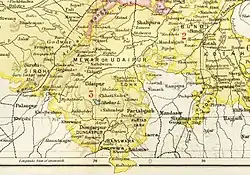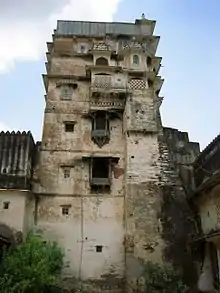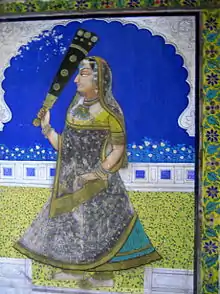Dungarpur State
Dungarpur State was a princely state during the British Raj. Its capital was the city of Dungarpur in the southernmost area of present-day Rajasthan State in India. In 1901 the total population of Dungarpur State was 100,103, while that of the town was 6094
| Dungarpur State डूंगरपुर रियासत | |||||||
|---|---|---|---|---|---|---|---|
| Princely State of British India | |||||||
| 1197–1947 | |||||||
 Flag | |||||||
 Dungarpur State in The Imperial Gazetteer of India | |||||||
| Area | |||||||
• 1901 | 3,781 km2 (1,460 sq mi) | ||||||
| Population | |||||||
• 1901 | 100,103 | ||||||
| History | |||||||
• Established | 1197 | ||||||
| 1947 | |||||||
| |||||||
| Today part of | Rajasthan, India | ||||||
| Dungarpur (Princely State) | |||||||


Dungarpur is the seat of elder branch of Sisodiyas of Udaipur, while the younger branch is the seat of the Maharana of Mewar.
History
Dungarpur State was founded in 1197 by Samant Singh, the eldest son of the ruler of Mewar, Karan Singh.[1] They are descendants of Bappa Rawal, eighth ruler of the Guhilot Dynasty and founder of the Mewar Dynasty (r. 734-753). The chiefs of the state, who bear the title of Maharawal, are descended from Mahup, eldest son of Karan Singh, chief of Mewar in the 12th century, and claim the honours of the elder line of Mewar. Mahup, disinherited by his father, took refuge with his mother's family, the Chauhans of Bagar,[2] and made himself master of that country at the expense of the Bhil chiefs, while his younger brother Rahup founded a separate Sisodia dynasty[3] [4]
The town of Dungarpur, the capital of the state, was founded towards the end of the 14th century by his descendant Rawal Bir Singh, who named it after Dungaria, an independent Bhil chieftain whom he had caused to be assassinated.[5] After the death of Rawal Udai Singh of Vagad at the Battle of Khanwa in 1527, where he fought alongside Rana Sanga against Babar, his territories were divided into the states of Dungarpur and Banswara.[5][6] Successively under Mughal, Maratha, and British Raj control by treaty in 1818, where it remained 15-gun salute state The revenue of the state was Rs.2,00,000 in 1901.[7]
Maharawals
The Maharawals belonged to the Guhil dynasty, Ahra Guhilot clan[8]
- 1497 – 1527: Udai Singh
- 1527 – 1549: Prithviraj
- 1549 – 1580: Askaran
- 1580 – 1606: Sesmal
- 1606 – 1609: Karam Singh II
- 1609 – 1657: Punja Raj
- 1657 – 1661: Girdhar Das
- 1661 – 1691: Jaswant Singh
- 1691 – 1702: Khuman Singh
- 1702 – 1730: Ram Singh
- 1730 – 1785: Shiv Singh
- 1785 – 1790: Vairisal
- 1790 – 1808: Fateh Singh
- 1808 – 1844: Jaswant Singh II
- 1844 – 1898: Udai Singh II (b. 1838 – d. 1898)
- 13 Feb 1898 – 15 Nov 1918: Bijay Singh (b. 1887 – d. 1918)
- 15 Nov 1918 – 15 Aug 1947: Lakshman Singh (b. 1908 – d. 1989)
The last princely ruler of Dungarpur was HH Rai-i-Rayan Maharawal Shri Lakshman Singh Bahadur (1918–1989), who was awarded KCSI (1935) and GCIE (1947), and after independence became a Member of the Rajya Sabha twice, in 1952 and 1958, and later a member of Rajasthan Legislative Assembly (MLA) in 1962 and 1989.[9]
References
- Sharma, Dasharatha, ed. (1966). Rajasthan Through the Ages. Bikaner: Rajasthan State Archives.
- Dungarpur State The Imperial Gazetteer of India, 1908, v. 11, p. 379.
- D. C. Ganguly 1957, p. 91.
- Rajput,Eva Ulian,p.15.
- Chisholm, Hugh, ed. (1911). . Encyclopædia Britannica. 8 (11th ed.). Cambridge University Press. pp. 679–680.
- Dungarpur Britannica.com.
- Dungarpur State The Imperial Gazetteer of India, 1908, v. 11, p. 382.
- States until 1947
- "Dungarpur (Princely State)". Queensland University. Archived from the original on 5 September 2011.
External links
 Media related to Dungarpur State at Wikimedia Commons
Media related to Dungarpur State at Wikimedia Commons